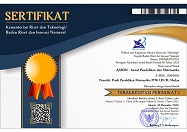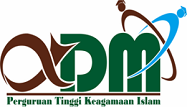EFEKTIVITAS PENDEKATAN PEMBELAJARAN MATEMATIKA REALISTIK TERHADAP KEMAMPUAN COMPUTATIONAL THINKING SISWA
Abstract
Kemampuan computational thinking merupakan salah satu keterampilan penting untuk membantu siswa dalam memahami konsep matematika. Namun kemampuan computational thinking siswa Indonesia masih rendah sehingga perlu adanya perencanaan pembelajaran yang relevan dan mampu meningkatkan kemampuan computational thinking siswa. Salah satunya dengan menerapkan pendekatan pembelajaran matematika realisik. Dengan pendekatan pembelajaran matematika realisik ini siswa akan terlibat dalam membangun sendiri konsep dan model yang dipakai melalui pemecahan masalah. Tujuan penelitian ini adalah untuk mengetahui dan mengkaji kembali kefektifan penggunaan pendekatan pembelajaran matematika realitik dalam meningkatkan kemampuan computational thinking siswa. Penelitian ini menggunakan metode eksperimen dengan pre-eksperimen pretest-posttest one group design. Populasi yang terlibat adalah 148 siswa kelas VII SMP Negeri 4 Bojonegoro dengan sampel 28 siswa pada kelas VII A tahun akademik 2022/2023. Teknik pengumpulan data berupa tes dan dokumentasi dengan instrumen penelitian berupa perangkat pembelajaran dan soal tes. Hasil penelitian menunjukkan bahwa pendekatan pembelajaran matematika realistik efektif meningkatkan kemampuan computational thinking. Hal tersebut didasarkan pada hasil analisis statistika deskripsif yang menunjukkan rata-rata pretest dan posttest yaitu 31,89 (kategori rendah) menjadi 74,62 (kategori sedang). Selanjutnya rata-rata peningkatan kemampuan computational thinking dengan uji Normalized Gain menunjukkan nilai 0,65 (kategori sedang). Selain itu, berdasarkan hasil analisis statistika inferensial dengan uji-t menggunakan paired sample t-test menunjukkan nilai signifikan kurang dari 0,05 (0,000 < 0,005) yang artinya terdapat perbedaan rata-rata yang signifikan sebelum dan sesudah penerapan pendekatan pembelajaran matematika realistik. Dan dari hasil perhitungan effect size sebesar 7,76 menunjukkan kategori berefek tinggi.
Abstract
Although computational thinking is an essential skill for students to comprehend mathematical concepts, Indonesian students’ computational thinking abilities remain low. Therefore, relevant learning plans are necessary to enhance their computational thinking abilities. One such plan is to apply a realistic mathematics learning approach, which involves students in constructing their own concepts and models through problem-solving. The aim of this research is to determine and review the effectiveness of using a realistic mathematics learning approach in improving students' computational thinking abilities. This study employed a pre-experimental method with a one-group pretest-posttest design. The sample consisted of 28 seventh-grade students, while the population involved 148 seventh-grade students from SMP Negeri 4 Bojonegoro during the 2022/2023 academic year. Data collection techniques, such as tests and documentation, employ research instruments in the form of learning tools and test questions. The research results indicate that the realistic mathematics learning approach is effective in enhancing computational thinking abilities. This is based on the results of descriptive statistical analysis which shows the average pretest and posttest is 31.89 (low category) to 74.62 (medium category). Furthermore, the average increase in computational thinking abilities with the Normalized Gain test shows a value of 0.65 (medium category). Apart from that, based on the results of inferential statistical analysis with a t-test using a paired sample t-test, it shows a significant value of less than 0.05 (0.000 < 0.005), which means there is a significant average difference before and after implementing the realistic mathematics learning approach, and from the calculation results the effect size is 7.76, indicating a high effect category.
Keywords
Full Text:
PDF (Indonesian)References
Batul, F.A., Pambudi, D.S., & Prihandoko, A.C. (2022). Pengembangan perangkat pembelajaran model sscs dengan pendekatan rme dan pengaruhnya terhadap kemampuan berpikir komputasional. AKSIOMA: Jurnal Program Studi Pendidikan Matematika, 11(2), 1282–1296. https://doi.org/10.24127/ajpm.v11i2.5074
Cahdriyana, R.A., & Richardo, R. (2020). Berpikir komputasi dalam pembelajaran matematika. LITERASI (Jurnal Ilmu Pendidikan), 11(1), 50–56. https://doi.org/10.21927/literasi.2020.11(1).50-56
Gadanidis, G., Cendros, R., Floyd, L., & Namukasa, I. (2017). Computational thinking in mathematics teacher education. Contemporary Issues in Technology and Teacher Education, 17(4), 458–477. https://www.learntechlib.org/primary/p/173103/
Jamna, N.D., Hamid, H., & Bakar, M.T. (2022). Analisis kemampuan berpikir komputasi matematis siswa smp pada materi persamaan kuadrat. Jurnal Pendidikan Guru Matematika, 2(3). https://doi.org/10.33387/jpgm.v2i3.5149
Kamil, M.R. (2021). Analisis kemampuan berpikir komputasional matematis siswa kelas ix smp negeri 1 Cikampek pada materi pola bilangan. AKSIOMA: Jurnal Matematika dan Pendidikan Matematika, 12(2), 259–270. https://doi.org/10.26877/aks.v12i2.8447
Laurens, T., Batlolona, F.A., Batlolona, J.R., & Leasa, M. (2017). How does realistic mathematics education (rme) improve students’ mathematics cognitive achievement? Eurasia Journal of Mathematics, Science and Technology Education, 14(2), 569–578. https://doi.org/10.12973/ejmste/76959
Lestari, K. E., & Yudhanegara, M. R. (2017). Penelitian pendidikan matematika. Refika Aditama
Lee, T.Y., Mauriello, M.L., Ahn, J., & Bederson, B.B. (2014). Ctarcade: Computational thinking with games in school age children. International Journal of Child-Computer Interaction, 2(1), 26–33. https://doi.org/10.1016/j.ijcci.2014.06.003
Nasution, D.P., & Ahmad, M. (2018). Penerapan pembelajaran matematika realistik untuk meningkatkan kemampuan komunikasi matematis siswa. Mosharafa: Jurnal Pendidikan Matematika, 7(3), 389–400. https://doi.org/10.31980/mosharafa.v7i3.133
Ndiung, S., Jehadus, E., Apsari, R.A., & others. (2021). The effect of treffinger creative learning model with the use rme principles on creative thinking skill and mathematics learning outcome. International Journal of Instruction, 14(2), 873–888. https://doi.org/10.29333/iji.2021.14249a
Saputri, Y., & Wardani, K.W. (2021). Meta analisis: efektivitas model pembelajaran problem solving dan problem based learning ditinjau dari kemampuan pemecahan masalah matematika sd. Jurnal Cendekia : Jurnal Pendidikan Matematika, 5(2), 935–948. https://doi.org/10.31004/cendekia.v5i2.577
Saraswati, N.D., & Astuti, S. (2022). Efektivitas penerapan model problem based learning dan problem solving terhadap kemampuan berpikir kritis matematika siswa kelas v sekolah dasar. Autentik : Jurnal Pengembangan Pendidikan Dasar, 6(2), 339–348. https://doi.org/10.36379/autentik.v6i2.259
Sari, A.C., Cindarbumi, F., & Istiqomah, H. (2022). Identification of creative thinking ability in online learning of lower group students by using the treffinger method. Journal of Medives: Journal of Mathematics Education IKIP Veteran Semarang, 6(2), 9–18. https://e-journal.ivet.ac.id/index.php/matematika/article/view/2125
Satrio, W.A. (2020). Pengaruh model pembelajaran kadir (koneksi, aplikasi, diskursus, improvisasi, dan refleksi) terhadap kemampuan berpikir komputasional matematis siswa. 1–252. https://repository.uinjkt.ac.id/dspace/handle/123456789/49706
Schleicher, A. (2019). PISA 2018: insights and interpretations. Oecd Publishing. https://www.oecd.org/pisa/PISA%202018%20Insights%20and%20Interpretations%20FINAL%20PDF.pdf
Setyawati, U.A., Kurniawati, N., & Bumi, F.C. (2022). Increasing junior high school students’ mathematical comprehension with realistic mathematics education (rme) Approach. Kontinu: Jurnal Penelitian Didaktik Matematika, 6(2), 133–146. https://doi.org/10.30659/kontinu.6.2.133-146
Sujarweni, V.W. (2014). Metodologi penelitian ( VW Sujarweni, Ed.). Yogyakarta: Pustaka Baru Press.
Supiarmo, M.G., Sholikin, N.W., Harmonika, S., & Gaffar, A. (2022). Implementasi pembelajaran matematika realistik untuk meningkatkan kemampuan berpikir komputasional siswa. Numeracy, 9(1), 1–13. https://doi.org/10.46244/numeracy.v9i1.1750
Tedre, M., & Denning, P.J. (2016). The long quest for computational thinking. Proceedings of the 16th Koli Calling International Conference on Computing Education Research, 120–129. https://doi.org/10.1145/2999541.2999542
Ulandari, L., Amry, Z., & Saragih, S. (2019). Development of learning materials based on realistic mathematics education approach to improve students’ mathematical problem solving ability and self-efficacy. International Electronic Journal of Mathematics Education, 14(2), 375–383. https://doi.org/10.29333/iejme/5721
Venkat, H., & Mathews, C. (2019). Improving multiplicative reasoning in a context of low performance. ZDM, 51, 95–108. https://doi.org/10.1007/s11858-018-0969-6
Weintrop, D., Beheshti, E., Horn, M., Orton, K., Jona, K., Trouille, L., & Wilensky, U. (2016). Defining computational thinking for mathematics and science classrooms. Journal of Science Education and Technology, 25, 127–147.
https://doi.org/10.1007/s10956-015-9581-5
Yadav, A., Stephenson, C., & Hong, H. (2017). Computational thinking for teacher education. Communications of the ACM, 60(4), 55–62. https://doi.org/10.1145/2994591
Yuanita, P., Zulnaidi, H., & Zakaria, E. (2018). The effectiveness of realistic mathematics education approach: The role of mathematical representation as mediator between mathematical belief and problem solving. PloS One, 13(9), e0204847. https://doi.org/https://doi.org/10.1371/journal.pone.0204847
Yunita, M.S., & Wiyanto. (2021). Pengembangan instrumen tes berbasis daring untuk mengukur keterampilan inkuiri ilmiah siswa pada materi suhu dan kalor. Unnes Physics Education Journal, 10(2), 106–113. https://doi.org/10.15294/upej.v10i2.54171
DOI: http://dx.doi.org/10.30821/axiom.v12i2.17411
Refbacks
- There are currently no refbacks.
Copyright (c) 2023 Laelatul Kharomah, Anisa Fitri, Festian Cindarbumi

This work is licensed under a Creative Commons Attribution-ShareAlike 4.0 International License.
p-ISSN: 2087-8249 | e-ISSN: 2580-0450
Indexed by:
AXIOM : Jurnal Pendidikan dan Matematika is licensed under a Creative Commons Attribution-ShareAlike 4.0 International License.











